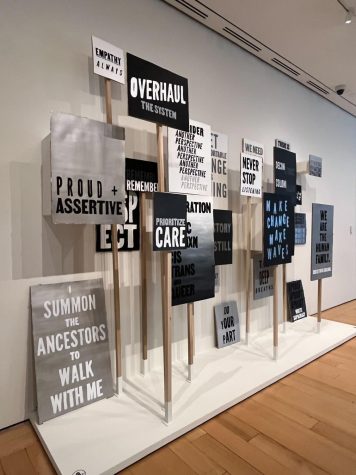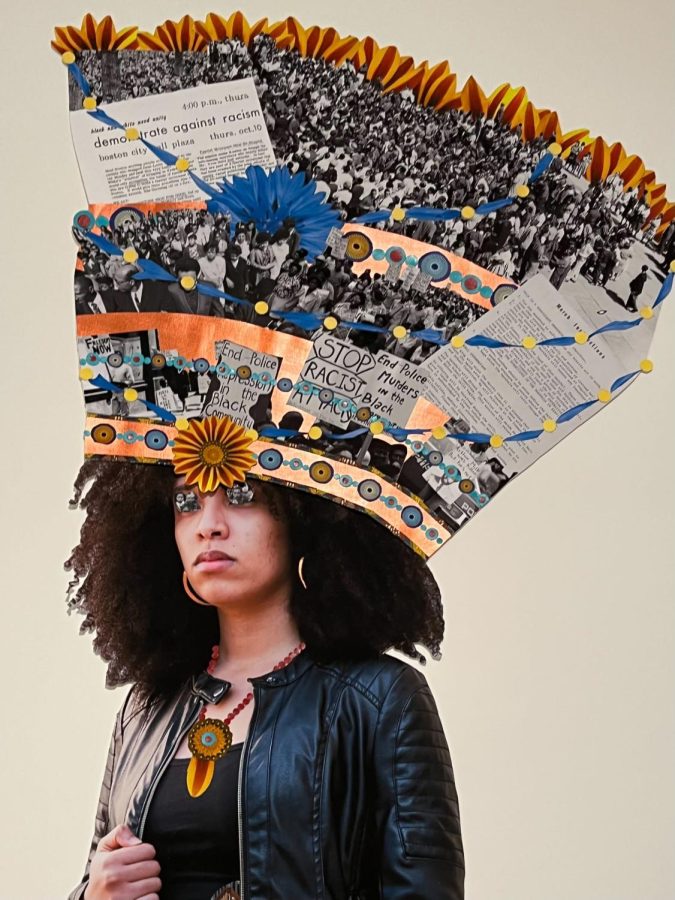Review: ‘Helina Metaferia: Generations’ celebrates overlooked impact of BIPOC women through history
Headdresses mark the dignity, pride and influence of women who have fought for their values.
March 3, 2022
Multidisciplinary and Ethiopian American artist Helina Metaferia pays homage to ancestry and Black, Indigenous and People of Color (BIPOC) women activists, in her exhibition, “Generations” at the Museum of Fine Arts.
The exhibition, rich with meaning about the strength of women and the tenacity of the oppressed, is part of the 2021 Traveling Fellow exhibition program at Tufts University’s School of the Museum of Fine Arts. In collaboration with the MFA, “Generations” is currently presented in the Edward H. Linde Gallery.
While the impact of women — especially those of color — has continuously been overlooked throughout civil rights movements in history, the female story is amplified in “Generations.” Here, women are the vital heroines.
Weaving together the strong ties of past and present in her art, Metafaria’s exhibition is made up of three parts: a mixed-media collage series where history literally sits on womens’ heads in the form of headdresses, an installation of protest signs that cry for revolution and a 17-minute film that tells the untold stories of four women’s forgotten foremothers.
On the right side of the gallery, a wall is lined with three large portraits of women as part of the “Headdress Series.” Metaferia calls them her “army of women.” The models, femme-identifying students of color from local Boston universities, contrast against the white canvas in splendid hues of pinks, oranges and yellows. On the head of each woman sits a headdress — an indication of dignity and influence — so regal yet heavy with the weight of history women carry on their head.
The womens’ headdresses are collages composed of monochromatic images of newspaper clippings and past BIPOC liberation demonstrations, scanned by Metaferia from the archives at Harvard University and Northeastern University. The collages tell stories of activism at the intersection of race, police brutality, the gender wage gap and LGBTQ+ pride.
Protesters in the images hold up signs that say, “End Police Murders in the Black Community,” “WOMEN OFFICE WORKERS” and “What’s Pride Got To Do With It? Everything.” Although these are photos from the past, they depict conflicts that still exist today; BIPOC communities advocate against police brutality and violence among their people, women are still fighting for equal pay and people in the LGBTQ+ community continue to defend their identity and rights.
Colorful flowers and bubbles adorn Metaferia’s army of women from head to toe, portraying the tender power of women activists who have profoundly influenced the past and will continue in the future.
On a neighboring wall is “The Woke,” a less colorful installation of black, white and gray painted protest signs. Mounted on wooden sticks, the signs stand tall and resolute. The signs’ big and bold letters are conspicuous and striking.

Posters and signs have long served as expressions of outrage and hope in social justice movements throughout history. Metafaria told the MFA that she believes it takes everyone’s participation to make a movement. According to an informational panel at the exhibit, Metaferia asked people to share their “everyday revolutions,” using the statements of anonymous contributors in her installation. Among the modern contributions, Metafaria also incorporates the voice of past femme activists in the slogans of “The Woke.”
A large sign reading “I SUMMON THE ANCESTORS TO WALK WITH ME,” leans against a wall, shimmering on silver painted canvas, paying homage to the predecessors of present day activists. Mounted on a wooden stick, a sign says “WE ARE THE HUMAN FAMILY — CHECK YOUR COUSINS.” At the very top of the wall, a small sign emerges that says “EMPATHY ALWAYS;” its arrangement and size imply the overlooked yet overarching values of love and understanding that have powered oppressed people for ages.
Alone, a singular protest sign is a small but undeniably significant ripple for change. But among the installation’s sea of signs, change is a powerful, sweeping wave.
In the quiet exhibit, an enchanting hum resonates from the distant left. It is the sound of Metaferia’s intergenerational film, “The Call,” playing on a TV fixed on the wall.
The screen shows four women — Melani N. Douglass, Asherah A. Douglass, Ayanna Gregory and Paula Whaley — sitting on a loveseat. These four women are descendants of legendary civil rights leaders Frederick Douglass, Dick Gregory and James Baldwin. But it is the stories of their foremothers that the women tell together.
Cherished photographs of Lillian Estelle Gregory, wife of Dick Gregroy; Anna Douglass, wife of Fredrick Douglass; and Emma Berdis Jones, mother of James Baldwin, are shared along with their untold stories. Their forgotten narratives of bravery and reliability reveal one truth to the viewers: it is women who quietly change the course of history.
“Without the women, the movement would have collapsed,” Gregory said in the film. “It is the same today.”
In Metafaria’s captivating film, there is also the sharing of art. The call for social solidarity and strength manifest through Asherah Douglass and Gregory’s singing of “Star People” by George Michael, Melani Douglass’ performance of a spoken-word poem and Whaley’s sculptural figures.
In one moment, the women all close their eyes. The scene cuts. In the next moment, their eyes open again, gazing directly at the camera. They no longer sit on a loveseat, but instead, on a bench at a former slave port in Fells Point, Maryland. There, they each toss a single-stem rose into the water as a ritual to commemorate their ancestors. Among the silence, there is remembrance.
In a mighty combination of inherited histories and femme influence, Metaferia evokes love and power in the space of just three walls.
Visually arresting and thought provoking, “Generations” leaves viewers with a newfound understanding of how generational trauma shapes present-day experiences. Above all, they bear witness to the women of color who always have, and always will, significantly change the course of history.
‘Helina Metaferia: Generations’ at the Museum of Fine Arts runs until April 11.












